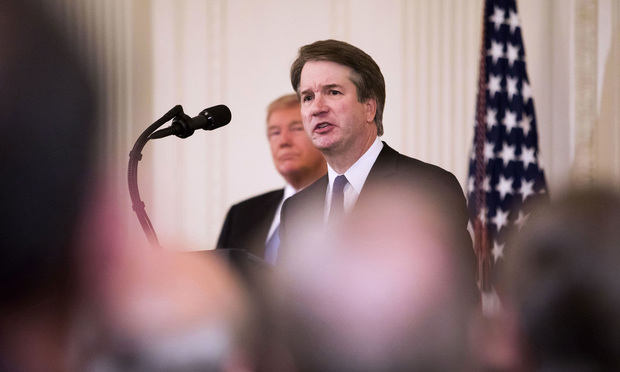If Confirmed, Will Kavanaugh Take the Supreme Court 'Express Train' to the Right?
In a conversation after the Senate hearing for Supreme Court nominee Brett Kavanaugh, Kate Shaw, a professor at Yeshiva University Benjamin N. Cardozo School of Law offered her insights with The National Law Journal about the court's future.
October 02, 2018 at 10:00 AM
6 minute read
 Judge Brett Kavanaugh addresses the assembled audience in the East Room of the White House moments after President Donald Trump nominated him to be Associate Justice at the U.S. Supreme Court after Justice Anthony Kennedy announced his retirement from the Court. July 9, 2018.
Judge Brett Kavanaugh addresses the assembled audience in the East Room of the White House moments after President Donald Trump nominated him to be Associate Justice at the U.S. Supreme Court after Justice Anthony Kennedy announced his retirement from the Court. July 9, 2018.
Kate Shaw, a professor at Yeshiva University Benjamin N. Cardozo School of Law, is no head-in-the-clouds academic. She keeps up with the Supreme Court's docket and, most recently, with the daily legal dramas of the Trump era.
That's in part because she is a contributor to ABC News, especially on Supreme Court matters. Her experience as a former law clerk to Justice John Paul Stevens and Seventh Circuit Judge Richard Posner, as well as her time in the Obama White House counsel's office, puts her in a position to analyze fast-breaking events with knowledge and enthusiasm. Plus, her husband is Chris Hayes, the MSNBC host.
In a conversation after the Senate hearing for Supreme Court nominee Brett Kavanaugh, Kate Shaw, a professor at Yeshiva University Benjamin N. Cardozo School of Law offered her insights with The National Law Journal about the court's future as it replaces retired Justice Anthony Kennedy. The conversation was edited for length and clarity.
National Law Journal: What did you make of the Kavanaugh confirmation hearing?
Kate Shaw: From the time that the announcement of Judge Kavanaugh as a nominee was made, it was pretty clear that, if he were confirmed, the law would move in a significantly more conservative direction. But I thought going into the hearing that there were a lot of questions about the way that we would get there and the way the court would get there.
You probably have three members of the court—Clarence Thomas, Neil Gorsuch and Samuel Alito—who would argue for taking an express train there, going pretty directly in a sharp conservative direction. And then I thought you would probably have two members, the chief justice and judge Kavanaugh, who would advocate a much more incremental and measured move toward the same destination.
Coming out of the hearing, I actually felt like Judge Kavanaugh was more likely than I had imagined to be on the express train, which I think means that we're going to be in a moment in which the chief justice writes the controlling concurrence in almost every area of law. If there are four justices who want to take up issues where it's going to be really hard to avoid squarely confronting important precedents, it's all going to come down to the chief.
NLJ: Do you see that shift happening as soon as this coming term?
KS: I don't think it could happen that quickly but obviously a lot will depend on what state legislatures feel emboldened to do following the confirmation of Judge Kavanaugh. But I think that, within the next couple of terms, if there are four votes to take up a major abortion case or a major gun case, we could see it happen in relatively short order.
NLJ: Apart from that, what big cases do you see in the new term?
KS: From a law professor perspective, there's a lot of fun and interesting stuff, but it's a little sleepier I think in the first couple of months. The Gundy v. United States case is a significant nondelegation doctrine challenge [one branch delegating its duties to another], and I think that a couple of members of the court have been very eager to revive a robust nondelegation doctrine. They have a chance to do that very soon in a pretty interesting case that sort of scrambles the kind of ordinary ideological assumption that you might make. This is a case in which the nondelegation doctrine would be applied to the benefit of convicted sex offenders, and it's a petition brought by a couple of liberal law professors from Stanford, Pam Karlan and Jeff Fisher. And yet it's been the conservative members of the court who have advocated reviving nondelegation doctrine, so it will be interesting to see how that plays out.
NLJ: Do you think anything relating to the Mueller investigation will get to the Supreme Court? I remember that in 2000 I wrote that the Supreme Court would never get involved in the Florida recount case. I sure was wrong about that.
KS: I think it seems quite possible. A challenge to the attempt to compel testimony, or one of these challenges not brought by the president but by someone else who is making constitutional challenge to the appointment of Robert Mueller. I think it's possible that the court could decide to steer clear, and so far the lower courts have upheld the appointment. But I do think, if you had a big lower court opinion finding the appointment unconstitutional, then it would be difficult for the court not to take the case up.
NLJ: In that case, does Justice Kavanaugh recuse himself?
KS: He declined to commit to doing it, and I think there probably will be a real push, but in the end I would be very surprised if he did. I would imagine he would participate.
NLJ: Stepping back, how different is the court now or in the future from the time you clerked there 10 years ago?
KS: With the replacement of Justice Kennedy with Justice Kavanaugh, you sort of have the final and perfect alignment of the party of the appointing president and the ideology of sitting justices. Justice Kennedy, a Republican appointee, voted with the liberal justices in a lot of important areas. Justice Stevens, for whom I clerked, was a Republican appointee, but voted with the liberal Justices most of the time. By the time I was with them, it was also true of Justice Souter. So that is a major historic shift.
NLJ: Final question, I have to ask: What was it like being on a podcast with your husband, and do you expect to be on his show anytime soon?
KS: With him? No, I won't go on. He asks me all the time. I will say that—I think I said this on the podcast—I was extremely reluctant to do it, because he asks me to be on the show pretty regularly and I would say no, it just seems strange. And I'm a contributor with ABC; I'd have to get permission, and also I'm doing the kids' bedtime, so I always say no.
Editor's Note This Q&A,which first appeared in our October print issue, went to press after Judge Brett Kavanaugh's first Senate hearing on Sept. 4 and before his second hearing on Sept. 27. It appears here online in its original form.
This content has been archived. It is available through our partners, LexisNexis® and Bloomberg Law.
To view this content, please continue to their sites.
Not a Lexis Subscriber?
Subscribe Now
Not a Bloomberg Law Subscriber?
Subscribe Now
NOT FOR REPRINT
© 2025 ALM Global, LLC, All Rights Reserved. Request academic re-use from www.copyright.com. All other uses, submit a request to [email protected]. For more information visit Asset & Logo Licensing.
You Might Like
View All
US Patent Innovators Can Look to International Trade Commission Enforcement for Protection, IP Lawyers Say

Zuckerman Spaeder Gets Ready to Move Offices in DC, Deploy AI Tools in 2025
5 minute read
Outgoing USPTO Director Kathi Vidal: ‘We All Want the Country to Be in a Better Place’
19 minute read
Ex-Deputy AG Trusts U.S. Legal System To Pull Country Through Times of Duress
7 minute readTrending Stories
Who Got The Work
J. Brugh Lower of Gibbons has entered an appearance for industrial equipment supplier Devco Corporation in a pending trademark infringement lawsuit. The suit, accusing the defendant of selling knock-off Graco products, was filed Dec. 18 in New Jersey District Court by Rivkin Radler on behalf of Graco Inc. and Graco Minnesota. The case, assigned to U.S. District Judge Zahid N. Quraishi, is 3:24-cv-11294, Graco Inc. et al v. Devco Corporation.
Who Got The Work
Rebecca Maller-Stein and Kent A. Yalowitz of Arnold & Porter Kaye Scholer have entered their appearances for Hanaco Venture Capital and its executives, Lior Prosor and David Frankel, in a pending securities lawsuit. The action, filed on Dec. 24 in New York Southern District Court by Zell, Aron & Co. on behalf of Goldeneye Advisors, accuses the defendants of negligently and fraudulently managing the plaintiff's $1 million investment. The case, assigned to U.S. District Judge Vernon S. Broderick, is 1:24-cv-09918, Goldeneye Advisors, LLC v. Hanaco Venture Capital, Ltd. et al.
Who Got The Work
Attorneys from A&O Shearman has stepped in as defense counsel for Toronto-Dominion Bank and other defendants in a pending securities class action. The suit, filed Dec. 11 in New York Southern District Court by Bleichmar Fonti & Auld, accuses the defendants of concealing the bank's 'pervasive' deficiencies in regards to its compliance with the Bank Secrecy Act and the quality of its anti-money laundering controls. The case, assigned to U.S. District Judge Arun Subramanian, is 1:24-cv-09445, Gonzalez v. The Toronto-Dominion Bank et al.
Who Got The Work
Crown Castle International, a Pennsylvania company providing shared communications infrastructure, has turned to Luke D. Wolf of Gordon Rees Scully Mansukhani to fend off a pending breach-of-contract lawsuit. The court action, filed Nov. 25 in Michigan Eastern District Court by Hooper Hathaway PC on behalf of The Town Residences LLC, accuses Crown Castle of failing to transfer approximately $30,000 in utility payments from T-Mobile in breach of a roof-top lease and assignment agreement. The case, assigned to U.S. District Judge Susan K. Declercq, is 2:24-cv-13131, The Town Residences LLC v. T-Mobile US, Inc. et al.
Who Got The Work
Wilfred P. Coronato and Daniel M. Schwartz of McCarter & English have stepped in as defense counsel to Electrolux Home Products Inc. in a pending product liability lawsuit. The court action, filed Nov. 26 in New York Eastern District Court by Poulos Lopiccolo PC and Nagel Rice LLP on behalf of David Stern, alleges that the defendant's refrigerators’ drawers and shelving repeatedly break and fall apart within months after purchase. The case, assigned to U.S. District Judge Joan M. Azrack, is 2:24-cv-08204, Stern v. Electrolux Home Products, Inc.
Featured Firms
Law Offices of Gary Martin Hays & Associates, P.C.
(470) 294-1674
Law Offices of Mark E. Salomone
(857) 444-6468
Smith & Hassler
(713) 739-1250










